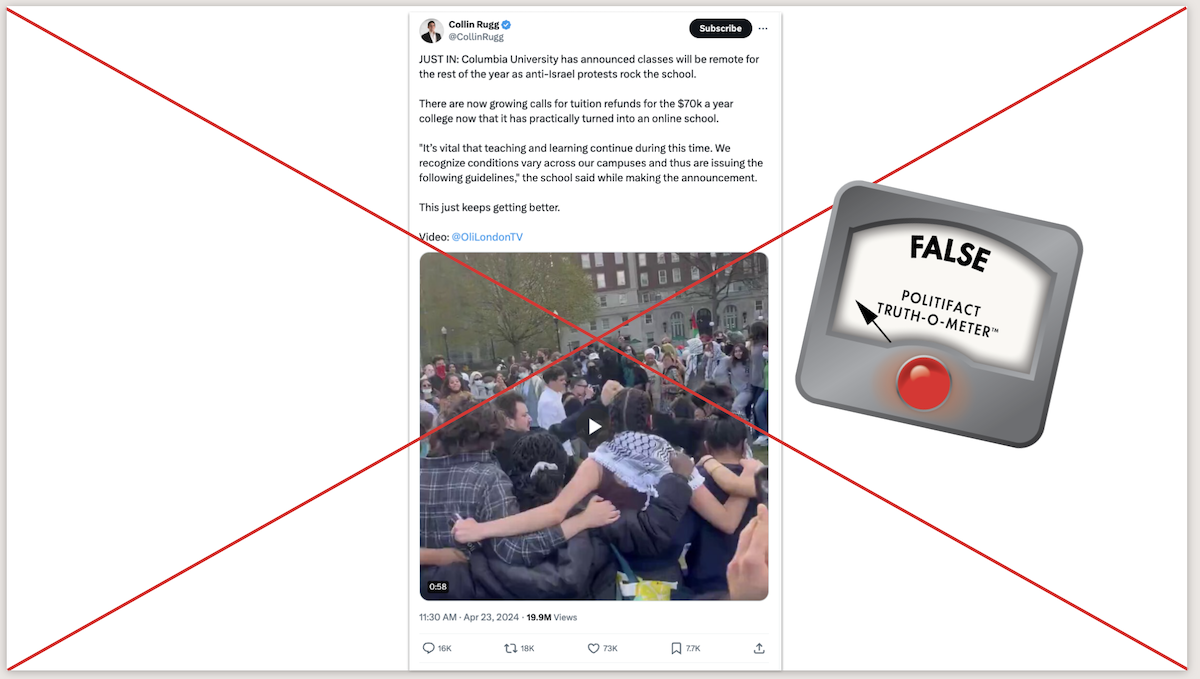As student protests by pro-Palestinian groups that oppose the Israel-Hamas war flared at college campuses in recent weeks, New York’s Columbia University has been in the spotlight, with student organizers setting up tents and Jewish students saying they have faced harassment and anti-Semitism.
The situation grew so tense that Minouche Shafik, the school’s president, instituted remote classes for one day. Some social media users, however, are telling a different story.
“Columbia University has announced classes will be remote for the rest of the year as anti-Israel protests rock the school,” said an X post that had 21 million views as of April 25, from Collin Rugg, co-owner of conservative news site TrendingPolitics. “There are now growing calls for tuition refunds for the $70k a year college now that it has practically turned into an online school.” We contacted Rugg for further comment but did not receive a reply.
An April 23 TikTok video had sticker text that said, “Breaking: Columbia University announced classes will be remote for the remainder of the school year due to anti-Israel protests.”
We found multiple social media posts making the same claim that Columbia has moved all classes online.
The claim also appeared on the April 24 cover of the New York Post’s print edition, with a headline that read, “School cancels all in-person classes for semester.”
But the claims overstate what’s happening at Columbia, which is providing students with the option to choose between attending classes remotely or in person, according to the school and news reports, including the student newspaper, the Columbia Spectator.
(X screenshot)
Columbia did move to all-remote classes April 22, a decision that Shafik said in a statement — released in the early morning hours that day — was intended to “deescalate the rancor and give us all a chance to consider next steps.” She cited some students’ “fears for their safety” and “examples of intimidating and harassing behavior on our campus.”
But she did not announce classes were virtual beyond that day. The same day, Columbia Provost Angela Olinto announced a hybrid schedule — meaning students have the choice to attend classes remotely or in person — for the school’s Morningside Heights main campus for the rest of the semester.
The spring semester’s last day of classes is April 29, so the hybrid policy will be in effect during five days of classes. Final exams are scheduled from May 3 to May 10, according to a school academic calendar. It wasn’t clear if exams could also be taken remotely. A Columbia spokesperson didn’t answer questions about hybrid classes but referred us to a “campus updates” webpage that linked to announcements.
The provost’s announcement said “it’s vital that teaching and learning continue during this time” and that conditions vary across campus.
Like many schools, Columbia added new classroom technology during the COVID-19 pandemic that allowed students to participate in classes in person or remotely. A school website refers to these as “HyFlex” courses.
Faculty in classrooms without the necessary hybrid technology “should hold classes remotely if there are student requests for virtual participation.” If that’s not possible, “we encourage faculty to provide other accommodations liberally to students who have requested support for virtual learning this week.”
Olinto said arts- and practice-based programs will remain in-person “with generous accommodations supported by school deans and staff.”
The school’s Irving Medical Center and Manhattanville campuses will remain in-person, “but (are) granting accommodations based on religious reasons, or approved disability accommodations.”
We rate claims that “Columbia University announced classes will be remote for the remainder of the school year” False.
